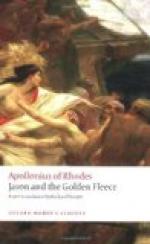Thereupon on the same day a pitiless fate seized Mopsus too, son of Ampycus; and he escaped not a bitter doom by his prophesying; for there is no averting of death. Now there lay in the sand, avoiding the midday heat, a dread serpent, too sluggish of his own will to strike at an unwilling foe, nor yet would he dart full face at one that would shrink back. But into whatever of all living beings that life-giving earth sustains that serpent once injects his black venom, his path to Hades becomes not so much as a cubit’s length, not even if Paeeon, if it is right for me to say this openly, should tend him, when its teeth have only grazed the skin. For when over Libya flew godlike Perseus Eurymedon—for by that name his mother called him—bearing to the king the Gorgon’s head newly severed, all the drops of dark blood that fell to the earth, produced a brood of those serpents. Now Mopsus stepped on the end of its spine, setting thereon the sole of his left foot; and it writhed round in pain and bit and tore the flesh between the shin and the muscles. And Medea and her handmaids fled in terror; but Canthus bravely felt the bleeding wound; for no excessive pain harassed him. Poor wretch! Already a numbness that loosed his limbs was stealing beneath his skin, and a thick mist was spreading over his eyes. Straightway his heavy limbs sank helplessly to the ground and he grew cold; and his comrades and the hero, Aeson’s son, gathered round, marvelling at the close-coming doom. Nor yet though dead might he lie beneath the sun even for a little space. For at once the poison began to rot his flesh within, and the hair decayed and fell from the skin. And quickly and in haste they dug a deep grave with mattocks of bronze; and they tore their hair, the heroes and the maidens, bewailing the dead man’s piteous suffering; and when he had received due burial rites, thrice they marched round the tomb in full armour, and heaped above him a mound of earth.
But when they had gone aboard, as the south wind blew over the sea, and they were searching for a passage to go forth from the Tritonian lake, for long they had no device, but all the day were borne on aimlessly. And as a serpent goes writhing along his crooked path when the sun’s fiercest rays scorch him; and with a hiss he turns his head to this side and that, and in his fury his eyes glow like sparks of fire, until he creeps to his lair through a cleft in the rock; so Argo seeking an outlet from the lake, a fairway for ships, wandered for a long time. Then straightway Orpheus bade them bring forth from the ship Apollo’s massy tripod and offer it to the gods of the land as propitiation for their return. So they went forth and set Apollo’s gift on the shore; then before them stood, in the form of a youth, far-swaying Triton, and he lifted a clod from the earth and offered it as a stranger’s gift, and thus spake:
“Take it, friends, for no stranger’s gift of great worth have I here by me now to place in the hands of those who beseech me. But if ye are searching for a passage through this sea, as often is the need of men passing through a strange land, I will declare it. For my sire Poseidon has made me to be well versed in this sea. And I rule the shore—if haply in your distant land you have ever heard of Eurypylus, born in Libya, the home of wild beasts.”




